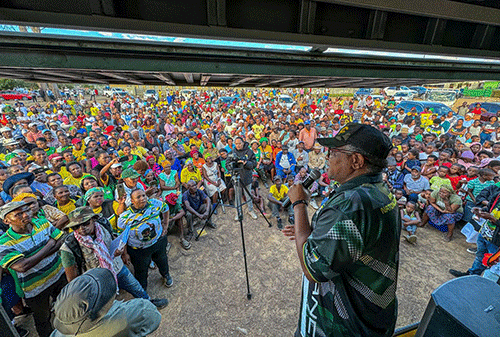Emmanuel Koro
JOHANNESBURG – In a year when more than 2.9 billion people in 64 countries – as well as the European Union – already have or will soon elect new governmental leaders, South Africa’s election still stands out as unique.
An American political expert notes that South Africans vote for a political party on a nationwide basis while in all other major democracies, citizens choose between two or more individuals competing in a defined geographic area.
“In South Africa, each political party selects the parliamentarians to serve from among its members, depending on the percentage of votes they receive in the election,” observed American public policy consultant Godfrey Harris, president of the Los Angeles-based Harris/Ragan Management Group and a former staff member of US’ 36th president Lydon Johnson.
“As a result, party members owe their primary loyalty in governing to an impersonal political organisation rather than to fellow citizens, or their conscience.
“Government by party is a common feature of authoritarian governments such as in Russia and China, and was seemingly designed into the South African constitution to make the transition from apartheid to a majority rule democracy smoother, quicker and more manageable by the ANC.”
Harris believes that this disconnect between government and the people is part of the reason that corruption in the country seems so difficult to deal with.
“It is as if there are two different worlds operating in parallel within South Africa – one for the leadership of the major political parties where the spoils of government are allocated, and another for everyone else,” he said.
“Members of parliamentary bodies in such democracies as the USA, UK and France provide voters with a connection to the wide variety of government services paid for with their taxes.
“It establishes a clear quid pro quo: I vote for Candidate X and X, once elected, makes sure that the policies I believe in and the services I need from government are delivered to me.
“For South African citizens, however, the equation has evolved in a totally different way.
“I vote for a party out of heritage, loyalty or habit, even if I know that that party will likely ignore my needs when it comes to its actions in and out of parliament.”
Harris notes, nevertheless, that at least one political party in the 2024 South African election campaign seems to be trying to change the current situation.
“The United Democratic Movement is using word of mouth promotional techniques to tell voters that if you give us more clout in a new government, the equation will change,” he said.
“The UDM has promised to extend the word of mouth connections it is making to an office in its headquarters to link its supporters with the agencies of the national government that can solve a problem, evaluate an idea, or implement a suggestion from its supporters.”
Harris thinks that such a connection among voters, UDM party officials, and government agencies would be immensely beneficial, especially to rural communities, which have been generally ignored in the delivery of government services.
He noted that “only the UDM has recognised this need in its political manifesto. There, the UDM pledges to ensure that South African rural communities benefit significantly from their natural resources through trade in wildlife products, trade in subterranean resources, carbon credits and medicinal plants benefits.”
Harris added: “In stark contrast, other parties say nothing about rural communities in their manifestos.
“To be fair, the ANC has recently pledged – well into the campaign and long after the UDM manifesto was published to do the same thing, but only in policy announcements that might never be fully implemented.”
The UDM is led by South Africa’s former deputy minister of environment, and an unwavering corruption-fighter, general Bantu Holomisa. He has promised in his party’s manifesto to push the new government on the need for rural communities to benefit significantly from the natural resources that abound around them.
Harris said that he applauds Holomisa’s ideas “for making South Africa’s democracy more representative, and finding ways to bring rural and younger South Africans into the country‘s political life.”
Harris’s first job in politics, he noted, was in 1952 as a 15-year-old receptionist in general Dwight D Eisenhower’s Beverly Hills (California) campaign office. Eisenhower proved to be both a successful military leader as well as an effective politician, who was twice elected president by the American people.
“It would be inspiring to see general Holomisa widen his political accomplishments to match his military successes, as Eisenhower did,” said Harris.
Meanwhile, Harris was stunned to learn in a conversation with a political operative in South Africa that “some citizens consider Nelson Mandela a failure in his service to South Africa.”
Why?
The individual said “Mandela did not get South Africa on a track that would make it a success in the eyes of the world. Instead, Mandela tolerated the ANC’s penchant to allow corruption as the price of establishing a fully-functioning government.”
Harris said that most disappointing element of the conversation with the Mandela critic was “the realisation that the individual – and probably most of the electorate as well – do not seem to appreciate all that is involved in governing a democracy.”
He said, “It (governing) is far more than just making speeches, cutting ribbons, greeting foreign dignitaries and expressing condolences after a disaster.
“I believe that ignorance allows so much of the ills of the country to fester.”
* Emmanuel Koro is a Johannesburg-based international-award-winning environmental journalist, who writes independently on environmental and developmental issues in Africa.


